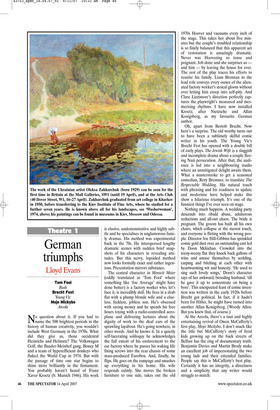German triumphs
Lloyd Evans
Tom Fool Bush Brecht Fest Young Vic Mojo Mickybo Arcola No question about it. If you had to name the 500 brightest periods in the history of human creativity, you wouldn’t include West Germany in the 1970s. What did they give us, those occidental Heinrichs and Helmuts? The Volkswagen Golf, the Baader-Meinhof gang, Boney M and a team of hyperefficient donkeys who fluked the World Cup in 1974. But with the passage of time one star begins to shine more brilliantly in the firmament. You probably haven’t heard of Franz Xaver Kroetz (b. Munich 1946). His work is elusive, undemonstrative and highly subtle and he specialises in unglamorous family dramas. His method was experimental back in the 70s. He interspersed lengthy dramatic scenes with sudden brief snapshots of his characters in revealing attitudes. But this nervy, lopsided method now looks formally exact and rather ingenious. Presentation mirrors substance.
The central character in Mensch Meier (oddly translated as ‘Tom Fool’ where something like ‘Joe Average’ might have done better) is a factory worker who, let’s face it, is incredibly dull. He lives in a drab flat with a plump blonde wife and a clueless, feckless, jobless son. He’s obsessed with saving money and he spends his free hours toying with a radio-controlled aeroplane and delivering lectures about the dignity of work to the deaf ears of the sprawling layabout. He’s going nowhere, in other words. And he knows it. In a quietly self-lacerating soliloquy he acknowledges the full extent of his enslavement to the car factory where he passes his waking life fixing screws into the rear chassis of some mass-produced Eurobox. And, finally, he flips. He goes on the rampage and smashes up everything in his home. His wife responds calmly. She moves the broken furniture to one side, takes out the old 1970s Hoover and vacuums every inch of the stage. This takes her about five minutes but the couple’s troubled relationship is so finely balanced that this apparent act of restoration is amazingly dramatic. Never was Hoovering so tense and poignant. Job done and she surprises us and him — by leaving the house for ever. The rest of the play traces his efforts to reunite his family. Liam Brennan in the lead role conveys every ounce of the alienated factory worker’s stoical gloom without ever letting him creep into self-pity. And Clare Lizzimore’s direction perfectly captures the playwright’s measured and mesmerising rhythms. I have now installed Kroetz, after Nietzsche and Allan Konigsberg, as my favourite German author.
Oh, apart from Bertolt Brecht. Now here’s a surprise. The old worthy turns out to have been a sublimely skilful comic writer in his youth. The Young Vic’s Brecht Fest has opened with a double bill of early plays. The Jewish Wife is a sluggish and incomplete drama about a couple fleeing Nazi persecution. After that, the audience is led into a neighbouring studio where an unmitigated delight awaits them. What a masterstroke to get a seasoned comedian, Rory Bremner, to translate The Respectable Wedding. His natural touch with phrasing and his readiness to update and modernise have helped make this show a hilarious triumph. It’s one of the funniest things I’ve ever seen on stage.
Nothing much happens. A wedding party descends into ribald abuse, adulterous seductions and all-out chaos. The bride is pregnant. The groom has built all his own chairs, which collapse at the merest touch, and everyone is flirting with the wrong people. Director Joe Hill-Gibbins has sprinkled comic gold dust over an outstanding cast led by Doon Mckichan. Crowded into the teeny-weeny flat they knock back gallons of wine and amuse themselves by scolding, carping and bitching at each other with heartwarming wit and honesty. ‘He used to sing such lovely songs,’ Doon’s character says of her awkward, brooding husband, ‘till he gave it up to concentrate on being a bore’. This unexpected feast of comic invention was written in the early 1920s before Brecht got political. In fact, if it hadn’t been for Hitler, he might have turned into another Allan Konigsberg. (Woody Allen. But you knew that, of course.) At the Arcola, there’s a taut and highly entertaining revival of Owen McCafferty’s first play, Mojo Mickybo. I don’t much like the title but McCafferty’s story of feral kids growing up on the back streets of Belfast has the ring of documentary truth. Benjamin Davies and Martin Brody make an excellent job of impersonating the two young lads and their extended families. People say this is McCafferty’s best play. Certainly it has an integrity, a directness and a simplicity that any writer would struggle to match.


































































 Previous page
Previous page